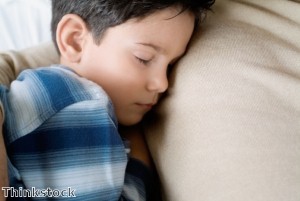As adults, and especially as parents, an occasional sleepless night is expected. Whether our kids keep us up or we're busy with work or domestic commitments, a night with less than the optimal amount of sleep often leaves us feeling groggy and grumpy.
Kids may also encounter these sleepless nights. The difference, however, is that lack of sleep can affect children in different ways. It can cause depression, increased susceptibility to colds and flu as well as concentration and memory problems.
Lack of sleep can cause a lot of stress and difficulty for a child," said pediatrician Dr Hannah Chow. "Kids can have a hard time concentrating which causes problems in school. There can be physical complications, such as headaches, and it can even cause a child to have a more negative outlook on life."
Doctors estimate as many as 70 percent of all children have difficulty falling asleep or sleep problems.
But there are things fathers can do to help their kids sleep better. They include establishing a bedtime routine, avoiding nighttime stimulation from TVs, computers and video games, eliminating caffeine, keeping kids' schedules manageable and ensuring the bedroom is comfortable.
Experts say the amount of sleep kids need depends on their age. Toddlers generally need 10-12 hours of sleep each night with a one-to-three-hour nap during the day. School-age kids should get no less than 10 hours of sleep and teens need at least 9-10 hours.
